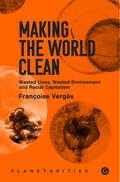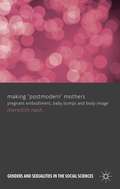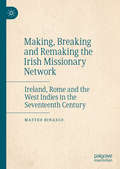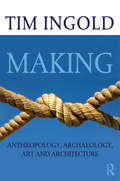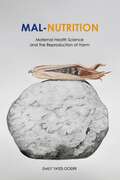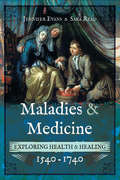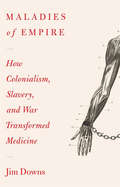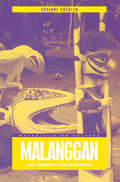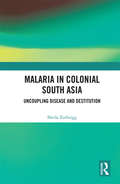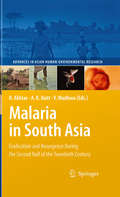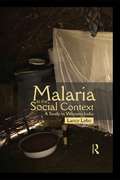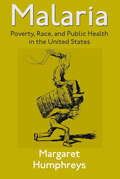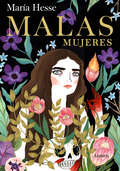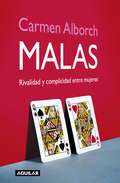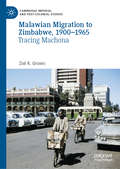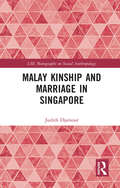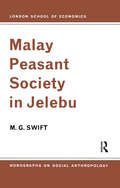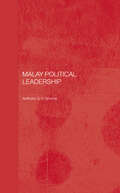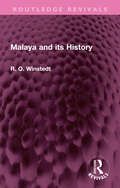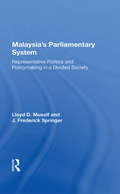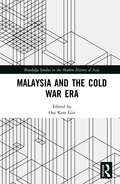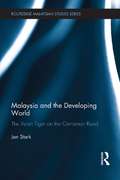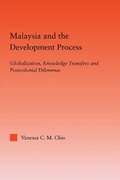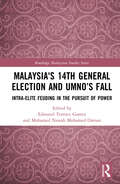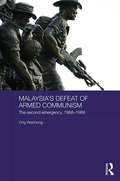- Table View
- List View
Making the World Clean: Wasted Lives, Wasted Environment, and Racial Capitalism (Goldsmiths Press / Planetarities)
by Francoise VergesAn antiracist theory of cleaning.In Making the World Clean: Wasted Lives, Wasted Environment, and Racial Capitalism, Françoise Vergès examines the racial and gendered politics of wasting lands, bodies, and resources and the organized deprivation of clean water, shelter, and access to health services—in other words, the structural denial, along racial lines, of vital needs. Through 38 short sections, she looks at the social relations that have made cleaning into drudgery and into a racialized, gendered, poorly paid job that is nevertheless necessary for any society to function. She concludes with the proposition of a feminist, decolonial, antiracist, anti-patriarchal, and anti-capitalist politics of cleaning. Or, simply put, of &“decolonial cleaning.&”To Vergès, the structural denial of the elemental needs of women of color (sanitary pads, access to water, and privacy for basic washing), and why these needs are considered insignificant and trivial, shows how racism and class war are gendered. By examining the banal, the trivial, and the elemental, the author addresses cleaning as a necessity rather than the maintenance of a consumerist lifestyle, a condition of basic care of the body and the mind that is considered with indifference by racial capitalism, white environmentalism, and even, too often, by humanitarian organizations. She argues that by building &“life-affirming institutions,&” as Ruth Wilson Gilmore advocates, struggles against the whitening of cleaning create sites of freedom. &“Decolonial cleaning&” imagines cleaning as taking care of land, humans, plants, animals, and rivers, not seeking to discipline them or transform them into commodities or objects of conservation but cleaning as a practice dedicated to sustaining the living world.
Making ‘Postmodern’ Mothers
by Meredith NashBased on interviews with pregnant women, this book provides a multi-disciplinary empirical account of pregnant embodiment and how it relates to wider sociological and feminist discourses about gender, bodies, 'fitness', 'fat', celebrity and motherhood.
Making, Breaking and Remaking the Irish Missionary Network: Ireland, Rome and the West Indies in the Seventeenth Century
by Matteo BinascoThis book reconstructs the efforts that were made to establish a missionary network between the two Irish Colleges of Rome, Ireland, and the West Indies during the seventeenth century. It analyses the process which brought the Irish clergy to establish two dedicated colleges in the epicenter of early modern Catholicism and to develop a series of missionary initiatives in the English islands of the West Indies. During a period of great political change in Ireland, continental Europe and the Atlantic region, the book traces how and through which key figures and institutions this clerical channel was established, while at the same time identifying the main obstacles to its development.
Making: Anthropology, Archaeology, Art and Architecture
by Tim IngoldMaking creates knowledge, builds environments and transforms lives. Anthropology, archaeology, art and architecture are all ways of making, and all are dedicated to exploring the conditions and potentials of human life. In this exciting book, Tim Ingold ties the four disciplines together in a way that has never been attempted before. In a radical departure from conventional studies that treat art and architecture as compendia of objects for analysis, Ingold proposes an anthropology and archaeology not of but with art and architecture. He advocates a way of thinking through making in which sentient practitioners and active materials continually answer to, or ‘correspond’, with one another in the generation of form. Making offers a series of profound reflections on what it means to create things, on materials and form, the meaning of design, landscape perception, animate life, personal knowledge and the work of the hand. It draws on examples and experiments ranging from prehistoric stone tool-making to the building of medieval cathedrals, from round mounds to monuments, from flying kites to winding string, from drawing to writing. The book will appeal to students and practitioners alike, with interests in social and cultural anthropology, archaeology, architecture, art and design, visual studies and material culture.
Mal-Nutrition: Maternal Health Science and the Reproduction of Harm
by Emily Yates-DoerrA free ebook version of this title is available through Luminos, University of California Press’s Open Access publishing program. Visit www.luminosoa.org to learn more.Mal-Nutrition documents how maternal health interventions in Guatemala are complicit in reproducing poverty. Policy makers speak about how a critical window of biological growth around the time of pregnancy—called the "first 1,000 days of life"—determines health and wealth across the life course. They argue that fetal development is the key to global development. In this thought-provoking and timely book, Emily Yates-Doerr shows that the control of mothering is a paradigmatic technique of American violence that serves to control the reproduction of privilege and power. She illustrates the efforts of Guatemalan scientists, midwives, and mothers to counter the harms of such mal-nutrition. Their powerful stories offer a window into a form of nutrition science and policy that encourages collective nourishment and fosters reproductive cycles in which women, children, and their entire communities can flourish.
Maladies & Medicine: Exploring Health & Healing, 1540–1740
by Jennifer Evans Sara ReadA lively account of medical practices in early modern England: &“Superb . . . an essential piece of social history.&” —Books Monthly It was an era when tooth cavities were thought to be caused by tiny worms and smallpox by an inflammation of the blood, and cures ranged from herbal potions, cooling cordials, blistering the skin, and of course letting blood. Maladies and Medicine tells the story of how the body was understood before the major advances of modern medicine, covering the theory of the four humors and the ways that male and female bodies were conceptualized. It also explains the hierarchy of healers, from university-trained physicians to the women who traveled the country offering cures based on inherited knowledge of homemade remedies, as well as the print explosion of medical health guides, which began to appear in the sixteenth century, from more academic medical textbooks to cheap almanacs. In twenty chapters discussing attitudes toward, and explanations of, some of the most common diseases and medical conditions of the period, the book reveals the ways people understood them and the steps they took to get better. It examines the body from head to toe, from migraines to gout. Case studies and personal anecdotes taken from doctors&’ notes, personal journals, diaries, letters, and even court records show the reactions of individuals to their illnesses and treatments, bringing us into close proximity with people who lived roughly four centuries ago. This richly illustrated study will fascinate those curious about the history of the body and the way our ancestors lived.
Maladies of Empire: How Colonialism, Slavery, and War Transformed Medicine
by Jim DownsA sweeping global history that looks beyond European urban centers to show how slavery, colonialism, and war propelled the development of modern medicine. Most stories of medical progress come with ready-made heroes. John Snow traced the origins of London’s 1854 cholera outbreak to a water pump, leading to the birth of epidemiology. Florence Nightingale’s contributions to the care of soldiers in the Crimean War revolutionized medical hygiene, transforming hospitals from crucibles of infection to sanctuaries of recuperation. Yet histories of individual innovators ignore many key sources of medical knowledge, especially when it comes to the science of infectious disease. Reexamining the foundations of modern medicine, Jim Downs shows that the study of infectious disease depended crucially on the unrecognized contributions of nonconsenting subjects—conscripted soldiers, enslaved people, and subjects of empire. Plantations, slave ships, and battlefields were the laboratories in which physicians came to understand the spread of disease. Military doctors learned about the importance of air quality by monitoring Africans confined to the bottom of slave ships. Statisticians charted cholera outbreaks by surveilling Muslims in British-dominated territories returning from their annual pilgrimage. The field hospitals of the Crimean War and the US Civil War were carefully observed experiments in disease transmission. The scientific knowledge derived from discarding and exploiting human life is now the basis of our ability to protect humanity from epidemics. Boldly argued and eye-opening, Maladies of Empire gives a full account of the true price of medical progress.
Malanggan: Art, Memory and Sacrifice (Materializing Culture)
by Susanne KüchlerShortlisted for the Katharine Briggs Folkore Award 2003 Malanggan are among the most treasured possessions in the Pacific, yet they continue to confound anthropologists. Central to funerals in New Ireland, these ‘death' figures are intended to decompose as symbolic representations of the dead. Wrapped in images that are conceived of as ‘skins', they are both visually complex and intriguing. This book is the first to interpret these mysterious agents of resemblance and connection as having a cognitive rather than a linguistic basis. Found in nearly every ethnographic museum in the world, Malanggan collections have been left virtually untouched. This original study begins by tracing the history of the collections and moves on to consider the role these artefacts play in sacrifice, ritual and exchange. What is the relationship between Malanggan and memory? How can Malanggan be understood as a life force as well as a vehicle for thought? In an analysis of the cognitive aspects of Malanggan, Küchler offers a highly original conceptualization of the centrality of the knot as a mode of being, thinking and binding in the Pacific. Malanggan: Art, Memory and Sacrifice is a groundbreaking study. Based on fifteen years of fieldwork and collection research, it provides an incisive new take on one of the Pacific's classic puzzles, as well as a wealth of new information and resources for anthropologists, collectors and curators alike.
Malaria in Colonial South Asia: Uncoupling Disease and Destitution
by Sheila ZurbriggThis book highlights the role of acute hunger in malaria lethality in colonial South Asia and investigates how this understanding came to be lost in modern medical, epidemic, and historiographic thought. Using the case studies of colonial Punjab, Sri Lanka, and Bengal, it traces the loss of fundamental concepts and language of hunger in the inter-war period with the reductive application of the new specialisms of nutritional science and immunology, and a parallel loss of the distinction between infection (transmission) and morbid disease. The study locates the final demise of the ‘Human Factor’ (hunger) in malaria history within pre- and early post-WW2 international health institutions – the International Health Division of the Rockefeller Foundation and the nascent WHO’s Expert Committee on Malaria. It examines the implications of this epistemic shift for interpreting South Asian health history, and reclaims a broader understanding of common endemic infection (endemiology) as a prime driver, in the context of subsistence precarity, of epidemic mortality history and demographic change. This book will be useful to scholars and researchers of public health, social medicine and social epidemiology, imperial history, epidemic and demographic history, history of medicine, medical sociology, and sociology.
Malaria in South Asia
by Rais Akhtar Ashok K. Dutt Vandana WadhwaThis highly topical book provides an in-depth account of the South Asian experience with the deadly disease that has held this region hostage for millennia. The book touches specifically on the resurgence of malaria experienced in the second half of the twentieth century, which occurred just a few years after malaria was thought to have been virtually eradicated from the region. The progress of this reappearance across space and time, as well as its causes and consequences, are discussed. The book also covers past, present and future ways to curb, control and ultimately, conquer malaria. As malaria continues to ravage the developing world, even in today's 'age of science', this is a particularly relevant book, especially as most studies analyze the problem in Africa, the continent that bears the brunt of this disease. Here, the authors call attention to challenges in South Asia, home to an immense at-risk population. The chapters in this book use a range of conceptual frameworks, quantitative analyses and descriptive aapproaches, finding that malaria is not just a complex disease driven by highly adaptive agents and vectors thriving in particular ecologies, but also a social concern deeply related to the region's cultural traditions, financial and developmental shortfalls, and inexorably related to political will. The book comprehensively deals with all aspects of the malaria situation in South Asia, and is invaluable to upper level students as well as emerging and established scholars in the fields of medical geography and epidemiology, Asian studies and development studies.
Malaria in the Social Context: A Study in Western India
by Lancy LoboThis book underscores how, apart from bacteriological factors, human behavioural characteristics as well as the socio-cultural factors that affect people’s lives contribute to the risk for and prevention of infection, with particular focus on malaria. It argues that the implementation of malaria-control measures can be successful only if it considers the human response to malaria and control measures. Any new tool which is introduced in a particular area — be it a new vaccine, a new drug combination, the promotion of impregnated bed nets, spraying of insecticides, or improved home management — will be effective and sustainable only if it is adapted to needs of the local population, i.e., if it makes sense to them. This volume also studies traditional knowledge systems with respect to health and malaria, arguing that local knowledge about infection is the result of an amalgamation of the biomedical and the traditional. By attempting to identify how traditional and biomedical elements interrelate in local illness concepts, it hopes to assist health interventionists in providing efficacious health education and awareness among people.
Malaria: Poverty, Race, and Public Health in the United States
by Margaret HumphreysFrom a prominent medical historian, “a fascinating story of the spread of malaria through the USA following its introduction in the seventeenth century” (Nature Medicine).Margaret Humphreys presents the first book-length account of the parasitic, insect-borne disease that has infected millions and influenced settlement patterns, economic development, and the quality of life at every level of American society, especially in the south and during its peak in the nineteenth century.Humphreys approaches malaria from three perspectives: the parasite’s biological history, the medical response to it, and the patient’s experience of the disease. It addresses numerous questions including how the parasite thrives and eventually becomes vulnerable, how professionals came to know about the parasite and learned how to fight it, and how people view the disease and came to the point where they could understand and support the struggle against it.In addition Malaria: Poverty, Race, and Public Health in the United States argues that malaria control was central to the evolution of local and federal intervention in public health, and demonstrates the complex interaction between poverty, race, and geography in determining the fate of malaria.“A masterpiece . . . recommended reading for anyone involved in or interested in health care.”?Southern Medical Journal“The lack of jargon makes the book accessible to a wide audience.”?Journal of the History of Medicine
Malas mujeres
by María HesseUna historia de las mujeres que han encarnado el mal, llena de humor e inteligencia, por la autora de Frida Kahlo y El placer, con más de 200.000 lectores. TODAS #MALASMUJERES UNO DE LOS DIEZ LIBROS MÁS ESPERADOS DE 2022 SEGÚN ESQUIRE NI LOCAS, NI TONTAS, NI PROVOCADORAS, NI FATALES: ¡MUJERES, BIENVENIDAS AL AQUELARRE! Desde la aparición de los primeros mitos, lo universal ha sido la narración de los hombres, esa visión masculina que dibujó a unos y a otras, nos dijo cómo debíamos ser -puras, dóciles, amorosas- y previno al mundo de las malas mujeres, ya fueran vengativas gorgonas, crueles madrastras, problemáticas Pandoras o Evas incautas que cargaron con la culpa de nuestro destino. En su personalísima versión, María Hesse da una vuelta de tuerca a esas princesas pasivas, brujas perversas, malas madres, femmes fatales, locas pasionales y secundarias perfectas, y, de Madame Bovary a Sarah Connor, de Juana «la Loca» a Yoko Ono, de Helena de Troya a Monica Lewinsky, de Medusa a Zahara o a Nevenka, reivindica la necesidad de encontrar otros referentes, nuevas lecturas de la Historia e inspiración para ser simplemente mujeres en el mundo en que vivimos. «Ahora sabemos que no hay que tener miedo a salirse de esas líneas caprichosas que otros marcaron, y que las que abrieron esas grietas buscando otros horizontes no estaban locas, ni eran perversas ni malos ejemplos para otras. Si acaso fueron mujeres valientes, fuertes, atrevidas, decididas. Rompedoras. Y si las llaman malas mujeres que se lo llamen; las paredes han caído y nosotras ya no estaremos ahí para oírlo».María Hesse La crítica ha dicho:«Con unas ilustraciones bellísimas y repletas de personalidad, su nuevo libro recupera la vida de las "malas mujeres" en una burla irónica e inteligente [...] porque igual no fueron malas mujeres, sino mujeres valientes, fuertes y rompedoras que merecen que Maria Hesse cuente (y dibuje) su historia.»Alberto Hernando, Esquire «María Hesse es uno de esos nuevos diamantes en bruto de la ilustración.»Harper's Bazaar «El dibujo no como horizonte escapista y mero entretenimiento, sino como reflejo de realidades y fuente de revelaciones.»Javier Ors, El Confidencial «Un estilo inconfundible que busca fusionar lo sintético con lo orgánico.»Javier Rubio Nomblot, ABC Cultural «[El trazo de Hesse]: personal, bello y delicado, es inconfundible.»Isabel Loscertales, Woman «Una obra vanguardista, íntima y conmovedora.»Lidia González, Traveler «Hesse tiene la enorme virtud de hacer que ídolos inalcanzables nos puedan parecer tremendamente cercanos.»Juan Rodríguez Millán, Cómic para todos «A través de su trazo suave y visceral habla de las luces y sombras de muchos referentes, de libertad, de amor, de amigas, de fuegos, de poesía, de imposiciones canónicas de belleza y de coños.»Marina López, Soria Noticias «La obra de María Hesse ha sido expuesta en diversas exposiciones y cuenta con un trabajo personal donde la sensibilidad y la mujer son las grandes protagonistas.»Seviocio
Malas: Rivalidad y complicidad entre mujeres
by Alborch, CarmenDe nuevo, como en su libro anterior, Carmen Alborch acierta al plantear, desde la franqueza intelectual, cuestiones que de verdad interesan a las mujeres. «Nos queremos, nos envidiamos, nos compadecemos, nos enfadamos, nos prestamos a la confidencia, nos apoyamos, competimos, nos divertimos y aprendemos juntas», escribe Carmen Alborch en la introducción a esta obra. La autora de Solas nos habla en las páginas de este libro de algunas cuestiones clave en las relaciones entre mujeres en el comienzo del siglo XXI: De la rivalidad que las ha enfrentado históricamente y aún las enfrenta por los mismos o nuevos motivos; de la presunción de #maldad# extendida a casi todas ellas por las tradiciones culturales hegemónicas en cada época histórica, de mujeres relevantes en numerosos y diferentes campos de la actividad humana, célebres o anónimas. Y también se refiere a la complicidad entre mujeres, esa hermosa connivencia tejida en mil alianzas y relaciones de muy variada naturaleza #algunas seculares, milenarias incluso-, otras más actuales con clara dimensión política, donde las mujeres se encuentran para que sus voces sean oídas y respetadas.
Malawian Migration to Zimbabwe, 1900–1965: Tracing Machona (Cambridge Imperial and Post-Colonial Studies)
by Zoë R. GrovesThis book explores the culture of migration that emerged in Malawi in the early twentieth century as the British colony became central to labour migration in southern Africa. Migrants who travelled to Zimbabwe stayed for years or decades, and those who never returned became known as machona – ‘the lost ones’. Through an analysis of colonial archives and oral histories, this book captures a range of migrant experiences during a period of enormous political change, including the rise of nationalist politics, and the creation and demise of the Central African Federation. Following migrants from origin to destination, and in some cases back again, this book explores gender, generation, ethnicity and class, and highlights life beyond the workplace in a racially segregated city. Malawian men and women shaped the culture and politics of urban Zimbabwe in ways that remain visible today. Ultimately, the voluntary movement of Africans within the African continent raises important questions about the history of diaspora communities and the politics of belonging in post-colonial Africa.
Malay Kinship and Marriage in Singapore (LSE Monographs on Social Anthropology #Vol. 21)
by Judith DjamourDr Djamour spent two years in Singapore, both in the city and in a Malay fishing village, and her first-hand account draws a lively and sympathetic picture of behaviour within the family and between kinsmen. It is nonetheless an important contribution to social anthropology and discusses, as its central topic, the instability of Malay marriage. The causes and consequences of this phenomenon, which involve social, economic, and psychological considerations, are analysed in some detail. The social picture which emerges has wide validity throughout the country and should prove of value to all who seek a fuller knowledge of Malay society.
Malay Peasant Society in Jelebu (LSE Monographs on Social Anthropology #Vol. 29)
by M. G. SwiftFirst published in 1939 and long out of print, this book remains unique as the only full and detailed account by a social anthropologist of a complete pagan Polynesian ritual cycle. This new single-volume edition omits some of the Tikopia vernacular texts, but includes a new theoretical introduction; postscripts have also been supplied to some of the chapters comparing the performances of 1928-9 with those witnessed by Professor Firth on his second visit to Tikopia in 1952. There is a specially written Epilogue on the final eclipse of the traditional ritual, based on a third visit by the author during the summer of 1966.
Malay Political Leadership
by Tony ShomeThis book demonstrates how particular values and 'notions of leadership', which underpinned traditional Malay leadership, have played a crucial role in the political evolution of the modern Malaysian nation. The author discusses the nature of Malay 'notions of leadership', and considers this throughout the Malay world at the local as well as at the national level, and goes on to describe and analyse leadership from pre-independence leadership in the colonial period through the rule of Malaysia's four prime ministers. He draws on anthropology, psychology, and political and economic history to show how Malay leaders have kept within the established track of the Malay value system, responding in particular to the expectation of their people to provide a sense of national identity and unity against the complex background of the Malaysian 'mosaic', while addressing the needs of the wider multi-ethnic community. Throughout the evolutionary development of Malay leadership, symbolisms for the perpetuation of leadership veneration persisted in its institutions and in the sublime power of the sultans. The Malay case offers one of the most remarkable studies of leadership, in its attempt to maintain indigenous primacy in a large multi-racial environment, subscribing to western democracy for its governance while retaining conservative Islamic values. This book is a significant contribution to the understanding of the evolution of leadership. It begins with an explanation of the early Malay World belief system and progresses to the period of colonization and nationalism. It then follows through the dynamics of modern politics encapsulating the biographical profiles of all Malaysia's Prime Ministers - Tunku, Razak, Hussein, and Mahathir - in three aspects: national unity, the economy and foreign affairs. The analysis of Mahathir's leadership extends into the new millennium. This is the only book with biographical profiles of all of Malaysia's Prime Ministers. This book will be of interest to students, academics, politicians, foreign affairs specialists and any reader interested in leadership studies and about Malaysia's political and economic history.
Malaya and its History (Routledge Revivals)
by R. O. WinstedtFirst published in 1948, Malaya and its History is a history of Malaya ranging from the thousand years of Hindu influence to the eras of Portuguese and Dutch rule, and from the establishment of the British protectorate to Malayan independence in 1957. There are chapters on law, trade, industry and the social services. This book will be of interest to students of history, southeast Asian studies, and cultural studies.
Malayasia's Parliamentary System: Representative Politics And Policymaking In A Divided Society
by Lloyd D MusolfMalaysia, a new nation whose very existence depends on holding disparate ethnic groups in balance, is an example of a developing nation whose legislature does influence policy. This pioneering survey and analysis of the Malaysian parliament carefully documents and interprets the interaction of legislator, party, and voter in Malaysia. The study ind
Malaysia and the Cold War Era (Routledge Studies in the Modern History of Asia)
by Ooi Keat GinFrom the end of the Second World War in 1945 to the collapse of the Soviet Union in 1991, there was a great deal of turmoil, tension and violence in what became Malaysia as a result of the 1963 Federation; upheavals included the Malayan Emergency of 1948・1960, the independence of Malaya in 1957, Konfrontasi with Indonesia of 1963・1966, the Philippines’ claim to Sabah, the Sarawak Communist Insurgency (1962・1990) and the Second Malayan Emergency of 1968・1989. This book breaks new ground in arguing for a longer trajectory of the Cold War, tracing this phenomenon back to 1920s’ colonial Malaya and Sarawak. Many new research findings showing how Malaysia coped with and overcame the many trials, challenges and difficulties are presented here, further enriching the historiography.
Malaysia and the Developing World: The Asian Tiger on the Cinnamon Road (Routledge Malaysian Studies Series)
by Jan StarkAs Malaysia’s economy grows and flourishes, strong new links are being forged with other developing countries in the region and beyond. This book traces the ways in which age-old organizational, political, religious and trade networks between Nusantara, the Malay World, and Central Asia, East Africa and the Middle East have changed in recent years. The book argues that these old links are being revived by new forms of globalization, modernization and knowledge transfer that are developing and implementing non-western models of governance, often in direct reference to Islam. The book goes on to explain how, as Malaysia develops new links with Indian Ocean countries, many of them Muslim countries, a new style trading network is being formed, a network with Islamic characteristics, which echoes Indian Ocean Islamic trading networks of earlier times. Interspersed with interesting methodological insights into the latest network, transnational and spatial theories, the book provides detailed case studies of Malaysia’s and Southeast Asia’s trade and numerous other links with Indonesia, Egypt, Zanzibar, Comoros and Central Asia, and concludes by assessing how Malaysia’s and ASEAN’s new style network is likely to develop and influence wider global networks. Written with a depth of knowledge reflective of the author’s many years of research throughout Asia, this book gives a real insight into how Malaysia’s mentalities, traditions and ways of thinking are being applied to its interactions with its immediate neighbours and the wider world.
Malaysia and the Development Process: Globalization, Knowledge Transfers and Postcolonial Dilemmas (Studies in International Relations)
by Vanessa C.M. ChioDrawing on recent deconstructions in anthropology, postcolonial studies, and critical sociology, Malaysia and the Development Process situates and explores the phenomenon of international knowledge transfers within the context of globalization. Based on primary and secondary research, and a series of 'experiential' reflections, fieldwork was conducted in two foreign electronics multinationals and a variety of public and semi-public institutions. The findings reassess issues of knowledge, power, subjectivity and agency, and the relations between the West and the non-West, as they are negotiated between and within multinational workplaces and local agencies in Malaysia.
Malaysia's 14th General Election and UMNO’s Fall: Intra-Elite Feuding in the Pursuit of Power (Routledge Malaysian Studies Series)
by Edmund Terence Gomez Mohamed Nawab Mohamed OsmanThe 2018 Malaysian General Election will stand as a major defining event in Malaysian history, when the ruling Barisan Nasional coalition unexpectedly lost power in the country they had ruled for over half a century. This volume brings together scholars who assess one fundamental factor that brought about this game-changing event in Malaysian politics: intra-elite feuding in the leading Malay-based political parties. This study provides an analysis of individual state politics as well as national trends shaped by the actions of leaders in government and the opposition. An indispensable guide for scholars studying the politics of Malaysia and of Southeast Asia more broadly, it will be of great interest for all readers with an interest in Malaysian politics.
Malaysia's Defeat of Armed Communism: The Second Emergency, 1968-1989 (Routledge Studies in the Modern History of Asia)
by Ong WeichongThe Malayan Communist Party’s (MCP) decisive defeat in 1960 led many academics and Counterinsurgency (COIN) experts to overlook the resurrection of its armed struggle in 1968. Most scholars continue to regard the so-called ‘Second Emergency’ in Malaysia (1968-1989) as a non-event, and most of the recently published work on the MCP tends to focus on the earlier Malayan Emergency (1948-1960). This book looks at the Second Emergency through recently released archival material from the National Archives in London, the National Australian Archives and the Australian War Memorial, as well as interviews with military and diplomatic officers from the UK and Thailand. It presents the first serious strategic and operational study of the Second Emergency, and analyses three areas of historical significance: the CPM’s strategy for armed struggle in the Second Emergency; the actual effectiveness of the CPM’s subversive propaganda on its target population and most importantly; the counterinsurgency (COIN) response and strategy of the Malaysian state and to a lesser extent the counter-subversion strategy of Singapore in the post-colonial era.
